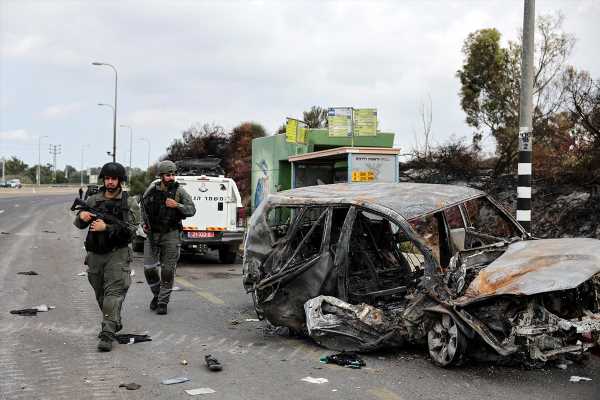Soma Ravi, an Indian caregiver in Ramat Gan, recounts the last 4 days in Israel and says the Indian embassy has been in constant touch.
It is not the rockets, but the infiltrators from Gaza who have entered Israel that are a source of grave worry for Soma Ravi.
“We don’t know what they will do and where they will go,” he tells Rediff.com‘s Archana Masih over the telephone from Ramat Gan in the Tel Aviv metropolitan area.
The Israeli authorities have asked people to be vigilant, not open the door to strangers and report suspicious people.
“We remain indoors and are not going out unless extremely necessary. It is all quiet outside. On Saturday-Sunday, it was like the Corona lockdown.”
Hailing from Telangana, Mr Ravi is employed as a caregiver and has lived in Israel for 18 years. He is president of the Israel Telangana Association. There are approximately 5,000 people from Andhra Pradesh and Telangana in Israel.
Around 18,000 Indian citizens live in Israel. Most are employed as caregivers for the elderly, the rest are in the diamond trade, IT professionals and students.
Since the Hamas attack on Saturday morning, the Indian embassy in Israel has been in touch with Mr Ravi to check about him and his Indian friends and acquaintances.
Two years ago, a rocket landed on a road 500 metres from the house he lives in Israel. One person died and the houses nearby suffered damage.
“We are used to rockets being fired. 95% of the rockets are destroyed by the Iron Dome missile defence system, but this kind of massive attack I saw for the first time,” says Mr Ravi, who attended the Pravasi Bhartiya Diwas for overseas Indians last year in Indore.
The area where he lives is around 80 kilometres from the Gaza Strip and is not affected as badly as the places near Gaza.
All schools, malls and shops are closed. Public transport has been trimmed. Police check posts have been set up for enhanced security.
Meanwhile, 24 hour shops catering to daily needs remain open.
“The barrage of rockets has quietened down compared to what it was in the first two days. We could see and hear them from our windows, but things are much better now,” he says.
Giving a sense of the capacity of the rockets, he says, “If they land on a building, they usually damage one or two flats.”
WATCH: A community bomb shelter with rooms, washrooms in Tel Aviv.
All houses are equipped with a bomb shelter. There are also community bomb shelters with bathrooms, beds and ventilation.
“They are like the strong room in a bank,” explains Mr Ravi. ‘The moment you hear the siren, you have to rush and take refuge in the safe room.”
The room he says is made of thick walls with an iron door. It has a bed and a washroom.
WATCH: A bomb shelter inside the house with a washroom and bed.
After having lived in Israel for nearly 20 years, he says the people are very friendly. His employers treat him as an equal. He eats his meals with them at the table, can eat anything out of the fridge and is treated like family.
“It is not like the Gulf,” he says.
He has not picked up Hebrew because most Israelis speak English.
Next month, he is planning to come home for leave after a year.
“By then,” he pauses, “I hope the situation will improve.”
Source: Read Full Article


